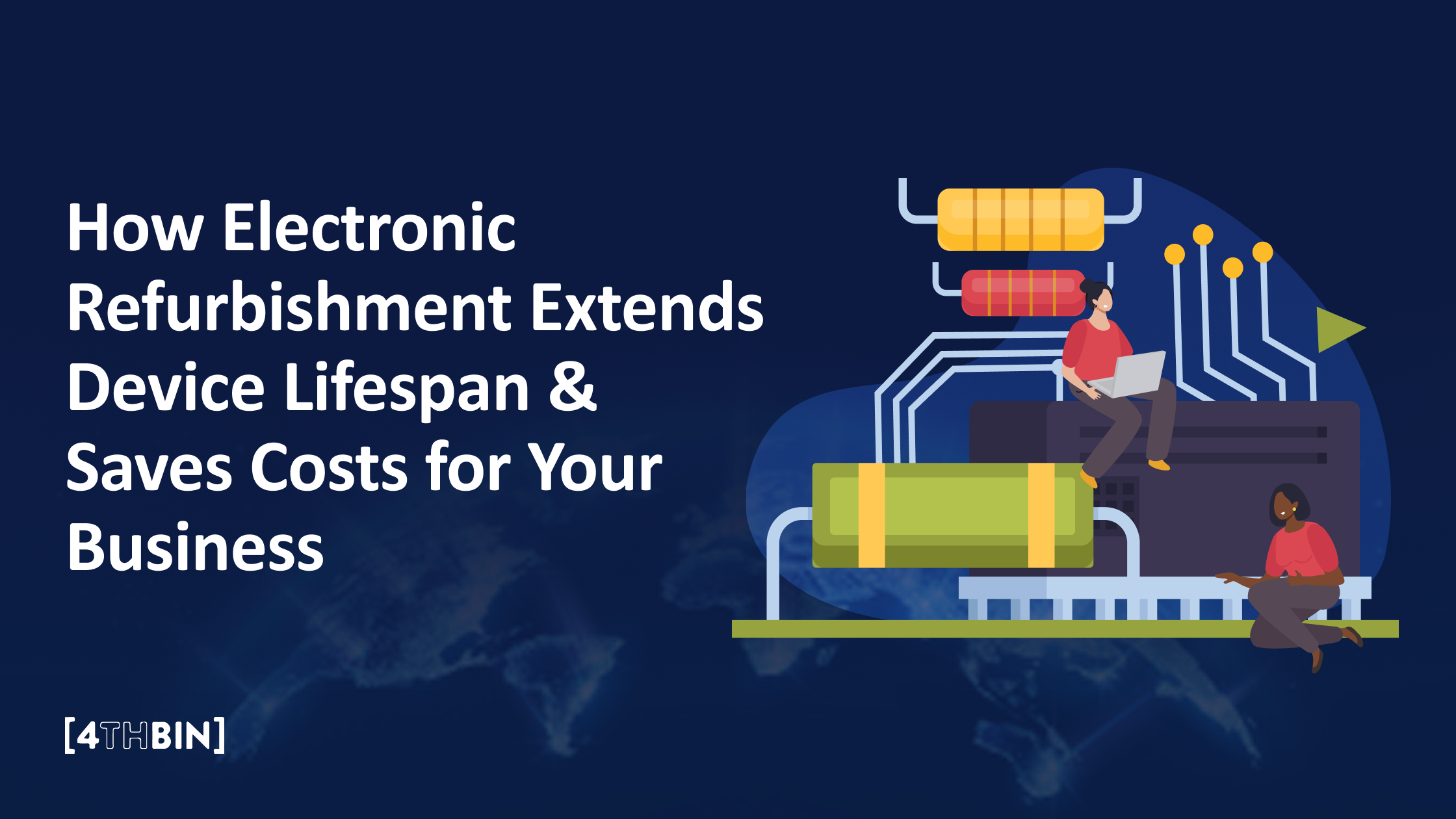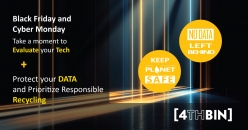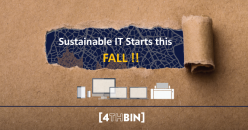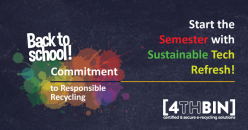How Schools and Businesses Can Effectively Manage E-Waste
In a world where technology takes over every classroom and workplace, the lifecycle of devices is becoming shorter than ever. These essential tools, from interactive whiteboards and student laptops to company tablets and projectors, are often upgraded or replaced within a few years.
But here’s the catch — for every new device introduced, an old one must be disposed of, and that’s where the problem begins.
With global e-waste production hitting 62 million tons in 2022 and projected to soar to 82 million tons by 2030, schools and businesses are responsible for managing outdated technology.
However, these institutions face unique challenges in responsibly disposing of electronics, making effective e-waste management essential to sustainability and operational efficiency. This lack of preparation leads to many discarded electronics piling up in storage rooms or, worse, finding their way to landfills where toxic chemicals can leach into the soil and water.
In this blog, we’ll explore the practical challenges schools and businesses face with e-waste management and actionable steps they can take to turn their organizational e-waste from a hazardous threat to a sustainable opportunity.
Challenges Schools and Businesses Face in Managing E-Waste
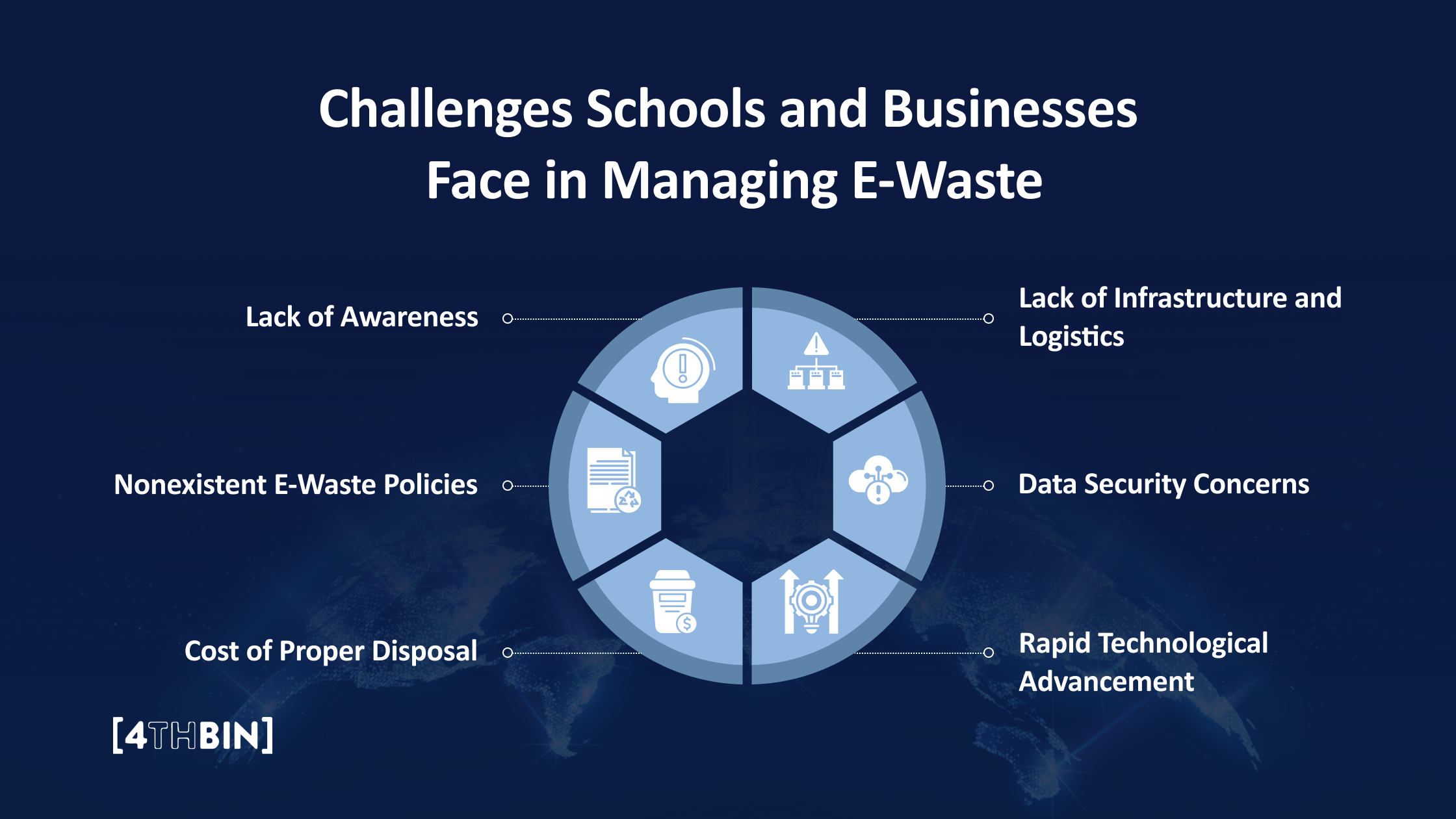
While the importance of e-waste management is widely acknowledged, schools and businesses still face several challenges when implementing effective disposal and recycling practices. Here are a few challenges schools and businesses face:
Lack of Awareness
One of the primary challenges many schools and businesses face is a lack of awareness regarding the proper techniques for e-waste disposal. Staff and management may not fully understand the environmental hazards of improperly discarded electronics, leading to casual disposal methods such as throwing them in regular trash or keeping them in storage indefinitely.
Moreover, schools and businesses often lack clarity on what can be classified as e-waste and which items can be recycled or reused. Without clear guidelines or education, many organizations fail to recognize the importance of partnering with certified e-waste recyclers or the need to implement sustainable disposal programs. Raising awareness through training programs or workshops can help bridge this knowledge gap and encourage responsible disposal practices.
Nonexistent E-Waste Policies
Another significant challenge is the absence of clear and up-to-date e-waste management policies within schools and businesses. Many organizations lack formal guidelines on handling outdated or broken electronic devices, leading to inconsistent or improper disposal practices.
In some cases, schools and businesses may have policies in place, but these are often outdated and don’t reflect the latest technological advancements or regulatory changes. For instance, as newer devices become more complex and contain various materials, outdated policies may not adequately address how to dismantle or recycle these items properly. Updating e-waste policies to include clear procedures for collection, storage, and recycling can help ensure that electronic waste is managed responsibly.
Cost of Proper Disposal
Financial concerns are a common challenge to proper e-waste management, particularly for schools and small businesses operating on tight budgets. Many organizations assume that disposing of e-waste is expensive, whether partnering with certified recyclers or paying for disposal services. While some services may have upfront costs, the long-term benefits—such as avoiding legal penalties, reducing environmental impact, and maintaining a positive reputation—far outweigh these expenses.
Moreover, not every electronic device needs to be recycled. There are also misconceptions about the actual costs of e-waste management. For example, many manufacturers offer buyback or trade-in programs for old electronics, reducing the financial burden on schools and businesses. Additionally, donating or refurbishing devices can provide economic incentives through tax write-offs or by extending the life of the equipment. Dispelling these myths and providing clearer financial options can make responsible e-waste management more accessible.
Lack of Infrastructure and Logistics
Another challenge schools and businesses encounter is the lack of infrastructure for collecting, storing, and transporting e-waste to proper disposal facilities. For example, organizations might not have dedicated e-waste bins or storage areas, leading to disorganized handling and accumulation of old devices.
In many regions, mainly rural areas, access to certified e-waste recycling facilities is limited, making it difficult for organizations to dispose of their electronic waste conveniently. Schools and businesses in such areas may need to coordinate with third-party service providers for pick-up and disposal, adding to logistical complexity.
Organizations can partner with local or regional recycling programs that offer collection services or set up internal processes for managing the logistics of e-waste disposal. Establishing designated e-waste collection points within the organization can streamline this process.
Data Security Concerns
A growing challenge in managing e-waste, especially for businesses and schools that handle sensitive information, is the concern over data security. Computers, servers, smartphones, and tablets often contain sensitive personal, financial, or proprietary data. The fear of data breaches or unauthorized access can lead organizations to store outdated electronics instead of recycling them.
To overcome this challenge, organizations should work with certified recyclers who offer data destruction services, such as securely wiping hard drives or physically destroying storage components. Educating staff about these secure options can encourage proper disposal without compromising data privacy.
Rapid Technological Advancement
The pace of technological change poses another challenge for managing e-waste. As schools and businesses constantly upgrade to newer devices, older equipment quickly becomes obsolete. The rapid turnover of electronics leads to a significant increase in e-waste, often overwhelming existing disposal processes.
Organizations may struggle to keep up with the volume of outdated devices, especially if they lack a proactive plan for retiring electronics. Establishing regular e-waste audits, where devices are evaluated for reuse, recycling, or disposal, can help manage the constant influx of electronic waste.
By overcoming these challenges, organizations can significantly reduce their e-waste footprint and contribute to a more sustainable future.
How Schools and Businesses Can Effectively Manage E-Waste

As technology advances, managing e-waste presents unique challenges for schools and businesses. Addressing these barriers, from awareness gaps to logistical issues, is essential for creating sustainable e-waste practices. Here’s how they can take proactive steps to manage e-waste effectively:
Implement a Clear E-Waste Policy
Schools and businesses should establish a clear and comprehensive e-waste management policy that outlines steps for recycling, disposal, and reuse. This policy should define what qualifies as e-waste, where and how items should be disposed of, and which stakeholders (like facilities management or IT) are responsible for overseeing proper practices.
Additionally, educating staff, students, and employees on the importance of e-waste management—and the consequences of improper disposal—helps foster a culture of environmental responsibility. Including visual guides near collection points can further encourage responsible e-waste practices.
Partner with Certified E-Waste Recyclers
Choosing certified e-waste recyclers is essential for safe disposal. Certified recyclers dismantle devices, salvage valuable metals, and neutralize toxic components, preventing harmful materials like lead, mercury, and cadmium from entering landfills or water supplies.
Schools and businesses should look for recyclers certified by organizations like e-Stewards or R2 (Responsible Recycling), such as 4THBIN, to ensure adherence to high environmental and ethical standards. Regular pickup schedules, secure data erasure, and detailed recycling reports from these partners can also streamline the process, making tracking and managing e-waste easier.
Encourage Reuse and Donation Programs
Not all obsolete electronics are without value. Schools and businesses can extend the life of older but functional devices by implementing reuse and donation programs. Devices no longer required internally can often be refurbished and donated to nonprofits, local community centers, or under-resourced schools. This approach not only reduces e-waste but also contributes positively to social causes.
Partnering with organizations specializing in refurbishing devices can simplify donation and ensure that devices are securely wiped out before reuse. This sustainable practice highlights a commitment to social responsibility and waste reduction.
Host E-Waste Collection Drives
Schools and businesses can regularly host e-waste collection drives, transforming e-waste management into a broader community effort. By organizing these drives as periodic events— quarterly or annually —institutions can help employees, students, and residents safely dispose of their e-waste.
Moreover, schools and businesses can conduct promotional campaigns explaining the impact of e-waste on the environment and advertise the event to increase participation and awareness. These drives help communities dispose of e-waste and cultivate a culture of environmental stewardship, showing the organization’s commitment to sustainability.
Invest in Sustainable Procurement
Sustainable purchasing practices can be crucial in reducing e-waste at its source. Schools and businesses can prioritize electronics that are durable, modular, and designed with repairability in mind. Opting for laptops with upgradeable RAM, replaceable batteries, or easily recyclable components can extend the lifecycle of devices and reduce the need for frequent replacements.
Additionally, organizations can reduce their carbon footprint by selecting products from brands that offer buy-back programs or take-back services. Sustainable procurement policies also communicate to stakeholders that environmental impact is a core consideration in decision-making.
Through these actionable steps, schools and businesses can effectively manage e-waste, ensuring a positive environmental impact and setting an example for responsible resource management in their communities.
Simplify Your Organization’s E-Waste Management with 4THBIN

Improper e-waste disposal can expose your organization to serious risks—environmental hazards, data breaches, and regulatory fines. Whether running a school or managing a business, 4THBIN offers trusted, certified e-recycling solutions that ensure your organization’s electronics are safely and responsibly handled.
With over a decade of experience, we serve over 10,000 businesses – from Fortune 100 companies to start-ups across the United States.
We believe that no data should be left behind! Backed by our data security expertise, we provide certified data destruction support to today’s top industries, safeguarding your company from the risks of data recovery associated with improper disposal.
Through our secure RemoteReturn program, direct mail-in service, and on-site collection, we offer flexible and reliable e-waste solutions suited to your business needs. We also help businesses fulfill their corporate social responsibility commitments by securely recycling their e-waste and contributing to a greener future.
Elevate Your E-Waste Management.
Contact Us



